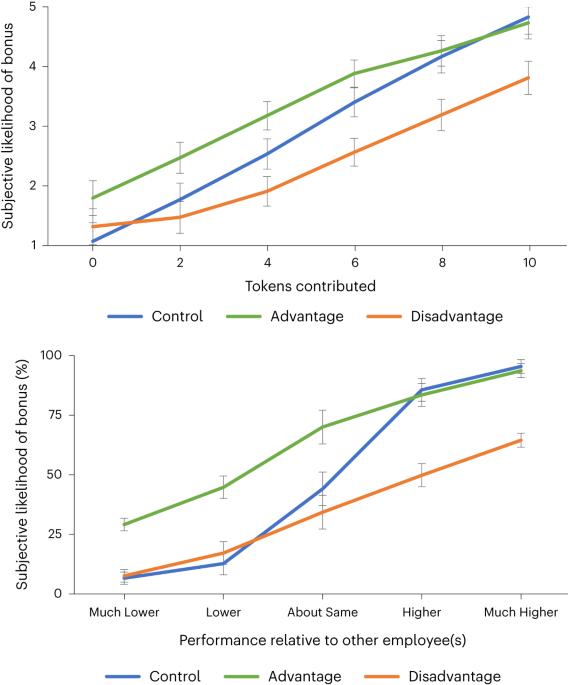Discrimination reduces work effort of those who are disadvantaged and those who are advantaged by it
IF 21.4
1区 心理学
Q1 MULTIDISCIPLINARY SCIENCES
引用次数: 0
Abstract
Research shows that discrimination is widespread in work organizations, yet we know little about the causal effects of discrimination on employees’ work effort. Here we argue that, by decoupling effort from rewards, discrimination reduces the work effort of those who are disadvantaged by discrimination and those advantaged by it. We test these arguments against the results of five experiments designed to model promotion situations in organizations (total N = 1,184). Together, these studies show that when supervised by a manager with a discriminatory preference, both disadvantaged and advantaged workers reduce their work effort relative to a control condition where the manager is not discriminatory. The negative effect of discrimination is larger for those disadvantaged by it. These effects are mediated by employees’ beliefs about how strongly work will impact their chances of reward. We then demonstrate that the relatively greater effort of advantaged—versus disadvantaged—workers in discriminatory organizations leads to a self-fulfilling prophecy: when faced with this effort differential, managers (N = 119) who did not have a priori discriminatory attitudes judged the advantaged category as more competent and deserving of workplace advancement than the disadvantaged category. Our results show that even though discrimination reduces all workers’ effort, it can ultimately produce outcomes that reify and entrench discriminatory beliefs. Using a set of experiments, the authors show that discrimination reduces work effort of those who are disadvantaged and those who are advantaged by it.

歧视减少了处于不利地位的人和处于有利地位的人的工作努力。
研究表明,歧视在工作组织中普遍存在,但我们对歧视对员工工作努力的因果影响知之甚少。在这里,我们认为,通过将努力与奖励脱钩,歧视减少了那些因歧视而处于不利地位的人和那些因歧视处于有利地位的人的工作努力 = 1184)。总之,这些研究表明,在具有歧视性偏好的管理者的监督下,相对于管理者没有歧视性的控制条件,弱势和优势工人都会减少他们的工作努力。歧视对那些处于不利地位的人的负面影响更大。这些影响是由员工对工作将对他们获得奖励的机会产生多大影响的信念所介导的。然后我们证明,在歧视性组织中,优势员工与弱势员工相对更大的努力会导致一个自我实现的预言:当面临这种努力差异时,管理者(N = 119)没有先验歧视态度的人认为优势类别比劣势类别更有能力,更值得在工作场所获得晋升。我们的研究结果表明,即使歧视减少了所有工人的努力,但它最终也会产生具体化和巩固歧视信念的结果。
本文章由计算机程序翻译,如有差异,请以英文原文为准。
求助全文
约1分钟内获得全文
求助全文
来源期刊

Nature Human Behaviour
Psychology-Social Psychology
CiteScore
36.80
自引率
1.00%
发文量
227
期刊介绍:
Nature Human Behaviour is a journal that focuses on publishing research of outstanding significance into any aspect of human behavior.The research can cover various areas such as psychological, biological, and social bases of human behavior.It also includes the study of origins, development, and disorders related to human behavior.The primary aim of the journal is to increase the visibility of research in the field and enhance its societal reach and impact.
 求助内容:
求助内容: 应助结果提醒方式:
应助结果提醒方式:


